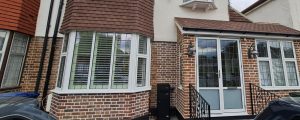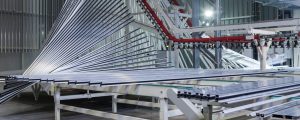Introduction
Sliding doors are a popular choice for modern homes and commercial spaces due to their space-saving design, ease of operation, and ability to enhance natural lighting. However, the type of glass used in a sliding door significantly impacts its durability, security, insulation, and overall functionality.
Selecting the right glass for a sliding door depends on factors such as safety, energy efficiency, soundproofing, and design preferences. This guide explores the best glass types for sliding doors, their advantages, and tips on how to choose the ideal option for your needs.
Factors to Consider When Choosing Glass for a Sliding Door
Before selecting a glass type, it is essential to consider the following factors:
- Safety and Security
- Sliding doors require strong glass to prevent breakage and ensure protection against intruders.
- Toughened or laminated glass offers higher resistance to impact.
- Energy Efficiency
- Energy-efficient glass reduces heat loss and keeps indoor temperatures stable.
- Low-E (low emissivity) glass helps in maintaining better insulation.
- Soundproofing
- Acoustic glass minimizes outside noise, making it ideal for homes near busy roads or commercial areas.
- UV Protection
- Certain glass types filter out harmful UV rays, protecting furniture and flooring from fading.
- Aesthetic Appeal
- Frosted or tinted glass enhances privacy while adding to the visual appeal of the space.
- Maintenance and Durability
- Easy-to-clean, scratch-resistant glass ensures long-term use with minimal upkeep.
Best Types of Glass for Sliding Doors
1. Tempered Glass (Toughened Glass)
Overview:
Tempered glass is a type of safety glass that undergoes a heat-treatment process to make it stronger than regular glass. If broken, it shatters into small, blunt pieces, reducing the risk of injury.
Benefits:
- Four to five times stronger than standard glass.
- Shatters into small, harmless pieces for safety.
- Resistant to thermal stress and high-impact force.
Best For:
- Residential and commercial sliding doors.
- Homes with children or pets for added safety.
- High-traffic areas where breakage risk is higher.
2. Laminated Glass
Overview:
Laminated glass consists of two or more layers of glass with an interlayer of polyvinyl butyral (PVB) or ethylene-vinyl acetate (EVA). This interlayer holds the glass together even if it breaks, making it one of the safest options for sliding doors.
Benefits:
- High security as the glass does not break into sharp pieces.
- Provides sound insulation, reducing external noise.
- Blocks up to 99% of UV rays, protecting furniture and interiors.
Best For:
- Homes requiring extra security against break-ins.
- Sliding doors in high-noise areas.
- Energy-efficient and UV-protective applications.
3. Low-E Glass (Low Emissivity Glass)
Overview:
Low-E glass has a special coating that minimizes heat transfer while allowing natural light to enter. It improves thermal efficiency and helps reduce energy bills.
Benefits:
- Reflects heat inside during winter and keeps interiors cool in summer.
- Reduces glare and UV exposure.
- Enhances insulation, making it ideal for energy-conscious homes.
Best For:
- Energy-efficient homes and buildings.
- Sliding doors in regions with extreme weather conditions.
- Homes with large glass areas that require temperature control.
4. Frosted Glass (Obscure Glass)
Overview:
Frosted glass is processed with acid-etching or sandblasting to create a translucent appearance, offering privacy while allowing light to pass through.
Benefits:
- Enhances privacy without blocking natural light.
- Available in various decorative designs.
- Reduces visibility from the outside, making it suitable for bathrooms and bedrooms.
Best For:
- Sliding doors in private areas such as bathrooms.
- Offices requiring partial visibility and style.
- Aesthetic enhancement of home interiors.
5. Tinted Glass
Overview:
Tinted glass has a color coating or film that reduces glare and heat penetration while adding a stylish look to sliding doors.
Benefits:
- Reduces heat buildup and glare from sunlight.
- Provides enhanced privacy and security.
- Available in various shades and colors to match home décor.
Best For:
- Homes in warm climates where sunlight exposure is high.
- Sliding doors leading to balconies or patios.
- Areas that require additional privacy without using curtains.
6. Double-Glazed Glass (Insulated Glass Unit – IGU)
Overview:
Double-glazed glass consists of two glass panes separated by an air or gas-filled space, providing superior insulation.
Benefits:
- Excellent thermal insulation, reducing energy costs.
- Enhances soundproofing for quieter indoor spaces.
- Provides additional security due to its layered structure.
Best For:
- Homes in extreme weather conditions (hot or cold).
- Sliding doors in noisy environments.
- Eco-friendly, energy-efficient home designs.
How to Choose the Best Glass for Your Sliding Door?
1. For Maximum Security
- Laminated glass or tempered glass offers enhanced protection against breakage and intrusions.
2. For Energy Efficiency
- Low-E glass or double-glazed glass reduces heat loss and helps maintain indoor temperatures.
3. For Noise Reduction
- Laminated glass or double-glazed glass minimizes external noise, ideal for urban areas.
4. For Privacy
- Frosted or tinted glass enhances privacy while allowing natural light to filter through.
5. For Aesthetic Appeal
- Frosted, tinted, or decorative glass provides an elegant look to sliding doors.
Conclusion
The best glass for a sliding door depends on specific needs such as security, energy efficiency, privacy, and aesthetics. Tempered glass is ideal for general safety, while laminated glass provides added security and soundproofing. Low-E and double-glazed glass are excellent choices for energy-efficient homes, while frosted and tinted glass enhance privacy and style.
Choosing the right glass ensures durability, comfort, and long-term benefits. Before making a decision, consult with professionals to select the most suitable option for your home or office sliding doors.
If you’re considering installing a high-quality aluminum sliding door, choosing the right glass can make all the difference. Explore options like Durajoin’s aluminum sliding doors for durable, stylish, and energy-efficient solutions that suit modern homes and commercial spaces.
Choosing the right glass ensures durability, comfort, and long-term benefits. Before making a decision, consult with professionals to select the most suitable option for your home or office sliding doors.


